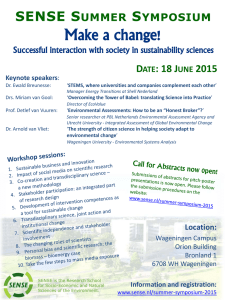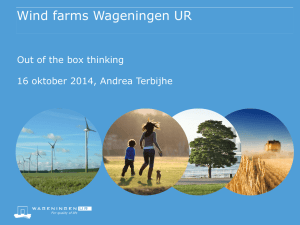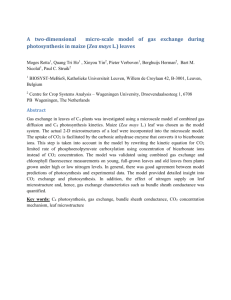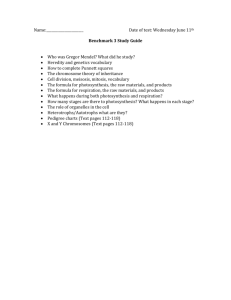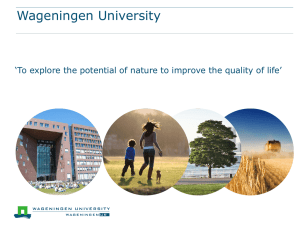The BioSolar Cells project Sustainable energy from photosynthesis
advertisement
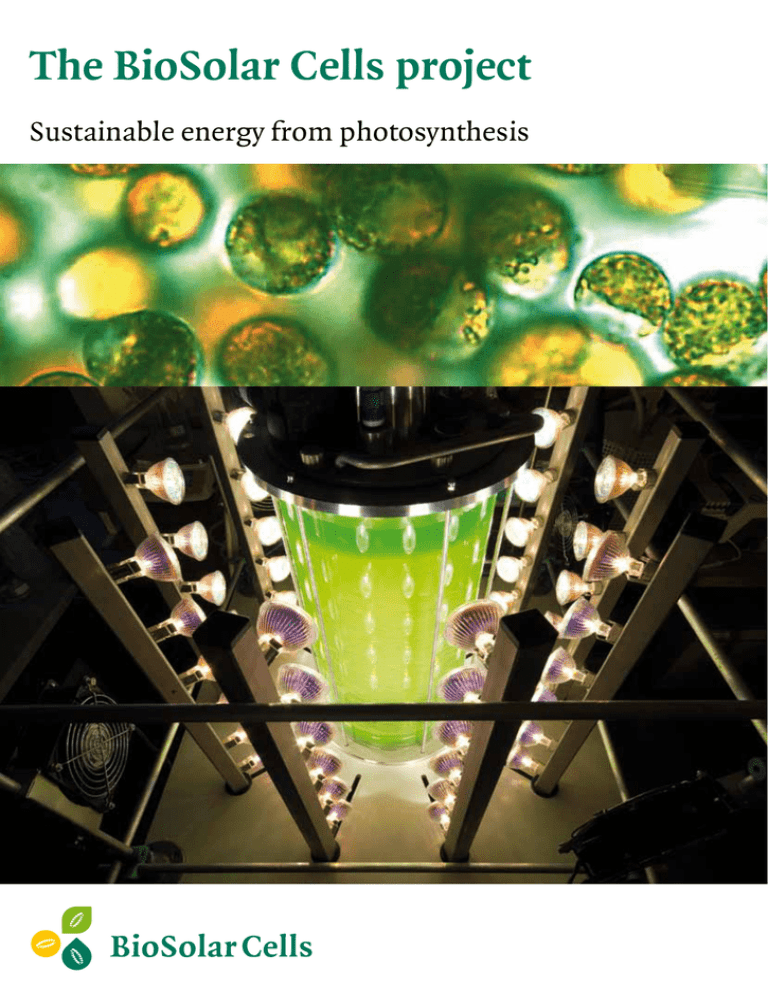
The BioSolar Cells project Sustainable energy from photosynthesis Photosynthesis is a complex process that occurs in many variations. The BioSolar Cells Project initiative aims to specifically use this diversity to improve this process and enhance its potential as a source of energy, biomass, feed and food. NADHP ATP Glucose PLANTS El ec tro n tra ns po rt ch ai n Photosystem I Photosystem II Energy Energy Energy What are BioSolar Cells? The world faces a rapidly increasing demand for sustainable energy. Man-caused changes that threaten the climate, together with oilsupplies that eventually will run short, forces us to rely on alternative biomass sources for products that now originate from oil. First and second generation biofuels cannot fulfill this need in a sustainable and societal acceptable manner. In addition, the world faces the challenge to increase agricultural production to adequately feed an increasing world population. Since the possibilities to increase the agricultural acreage are limited, this largely must be accomplished by improving the landproductivity. The largest option available is the sun and it is our challenge to make the most of this incredible resource. While solar power currently revolves primarily around the application of photovoltaic cells, new options are available with photobiological cells or BioSolar Cells. These have various benefits: BioSolar Cells are natural systems or systems based on natural processes that use photosynthesis to convert sunlight into useable energy. This occurs in many ways, and the BioSolar Cells Project focuses on three options: 1 Increasing the photosynthetic efficiency of plants Outcome: More biomass and higher yields per given surface area. 2 Direct production of fuels, bypassing the biomass phase. Outcome: Photosynthetic cyanobacteria or algae that produce butanol, for example. 3 Combining natural and technological components. Outcome: ‘Artificial Leaves’ that highly efficiently produce hydrogen gas or syn-gas from solar energy. • Production of these cells is in principle inexpensive; • The biological materials used are not rare; • The cells can produce liquid fuels directly. An additional advantage is that BioSolar Cells can capture the greenhouse gas CO2. Photosynthesis Photosynthesis is the key processes on this planet - the foundation for all (fossil) energy and therefore for life. Less well known is that photosynthesis is an enormous diverse process that occurs in many different organisms. This means that there is a great deal of biological variation that can be explicitly deployed to improve photosynthesis. Results There are many possible results. One example is the development of high production plants that are used for both food and feed. Another is the cultivation of micro-organisms on large patches of land or (sea) water that are currently unusable for biofuel production. And then there is the development of solar collectors that can refuel our cars at night. There are already numerous possibilities and some applications are within reach. Further exploration of photosynthesis will result in new, unexpected options. Although true innovations cannot be predicted, they can be guided. Solar energy New solar cell Electrical energy H2O H+ + O2 + e- Chemical energy NAD+ + H+ NADH NADH CO2 NADH HCOOH NADH H2CO CH3OH Generation of methanol (CH3OH) from CO2 Initiators Participating knowledge institutes Participating companies The Netherlands has a rich tradition in the Plant Research International, part of Wageningen UR BASF Antwerpen N.V. Wageningen UR Food & Biobased Research Biomethanol Chemie Nederland B.V. Wageningen University, part of Wageningen UR Bruker Nederland B.V. University of Groningen Drie Wilgen Development B.V. Delft University of Technology the challenge of combining and enhancing DSM Eindhoven University of Technology this knowledge so as to be able to use University of Amsterdam ExxonMobil Research and Engineering Company photosynthesis for sustainable energy supplies Leiden University GEA Mechanical Equipment and for securing food production. Driven by University of Twente Heliae Development LLC the social relevance and scientific possibilities, VU University Amsterdam Lionix B.V. a number of authoritative Dutch research HAS Den Bosch Neste Oil field of photosynthesis research and excellent research groups in all relevant subsectors. This has created a considerable background of photosynthesis know-how. We now face Bioclear B.V. groups decided to join forces in the BioSolar Nijhuis Water Technology B.V. Cells Project: Paques B.V. • Wageningen UR (University & Research centre) Room for new partners Philips Electronic Nederland B.V. Plant Dynamics B.V. The BioSolar Cells Project aims to bring together • Leiden University key-expertise in the photosynthesis sector and • VU University Amsterdam is always on the lookout for new partners and • University of Groningen ideas. The participation of leading knowledge • Delft University of Technology institutions and companies guarantees constant • University of Amsterdam renewal and the utilisation thereof. We invite Proces-Groningen B.V. Proviron Holding N.V. Pursuit Dynamics PLC Roquette Freres S.A. Saudi Basic Industries Corporation Simris Alg AB all national and international organisations that Public-private Staatsolie Maatschappij Suriname N.V. believe they can contribute to the project’s Stichting Waag Society success to contact us and join the project. Synthetic Genomics Incorporated The BioSolar Cells Project is a joint initiative of companies and knowledge institutions, Total Unilever Research and Development Vlaardingen B.V. supported by the Dutch government. The Information programme will last five years and has a Dr. R. Klein Lankhorst, Director Operations total budget of 42 million euro. Companies Project Office BioSolar Cells and knowledge institutions will account for P.O. Box 98 17 million euro, whereas the government 6700 AB, Wageningen contributes the remaining 25 million euro. The Netherlands Co-financed by Tel: +31 317 481 096 •Ministery of Economic Affairs, Agriculture Email: office@biosolarcells.nl Internet: www.biosolarcells.nl • ALW (NWO Earth and Life Sciences) and Innovation Projects within BioSolar Cells Project leader University / Institute Development of supramolecular catalysts Joost Reek University of Amsterdam Development of fast, efficient and device compatible antenna Ernst Sudhölter Delft University of Technology Development of device compatible charge separators. Romano Orru VU University Amsterdam Functional assessment and characterization of artificial photosynthetic systems with time-resolved spectroscopy and spectroelectrochemistry John Kennis/ Raoul Frese VU University Amsterdam Solid state NMR analyses of PCET and catalysis Huub de Groot Leiden University Development of semiconductor tandem junctions and photocatalytic devices Roel vd Krol/ Marc Koper Leiden University Leiden University Characterization and predictive modeling of nanodevice components Huub de Groot BIOCOMET: Using Solar cells for the production of methanol from CO2 Jules Beekwilder Wageningen UR S2FC: the Solar to Fuel Chip Jurriaan Huskens University of Twente A Thylakoid Multiscale Engineering Platform Agur Sevink Leiden University Defect engineering at oxide interfaces: Towards efficient ultra-thin absorber films Roel van de Krol Delft University of Technology Nanostructured solar-to-fuel devices Jurriaan Huskens University of Twente Photoelectrochemical water splitting in artificial nanostructured solar converters René Janssen Eindhoven University of Technology Engineering surface electrical fields and charge separation in water-splitting perovskites Rinke Wijngaarden VU University Amsterdam Nanowire solar energy conversion Jos Haverkort Eindhoven University of Technology Photocatalytic water splitting in microfluidic devices Joost Reek University of Amsterdam Selective photoreduction of CO2 fuels in a microreactor platform Elisabeth Bouwman Leiden University New photosynthetic cell factories for bio-butanol production Klaas Hellingwerf University of Amsterdam Microalgae as photosynthetic cell factories for biofuel production René Wijffels Wageningen UR From proteins to the thylakoid membrane Rienk van Grondelle VU University Amsterdam Growth optimization of diatoms: antenna size of photosynthetic proteins and the role of stress and CO2 Egbert Boekema University of Groningen Harvesting sunlight in a biodegradable polymer: Extracellular production of crystalline cellulose by Cyanobacteria Klaas Hellingwerf University of Amsterdam A complementary photosystem for proton pumping in Synechocystis PCC 6803 Wim de Grip Leiden University Algae Pilot Production and Development Centre Research programme: Selection of algae strains based on the comparison of photosynthetic activity in different reactor production units Maria Barbosa Wageningen UR Harvesting sunlight with microorganisms: metabolomics with microcoil fMRI Huub de Groot Leiden University Photosynthesis and growth optimization of cold water diatoms for production of PolyUnsaturated Fatty Acids Anita Buma University of Groningen High efficiency seaweed based photo-bioreactor Willem Brandenburg Wageningen UR Application of on/off modulation and time-separated wavelength tuning for high yield phototrophic growth of the cyanobacterium Synechocystis PCC 6803 Hans Matthijs University of Amsterdam Studying the regulation of light harvesting in the green alga Chlamydomonas to improve its productivity under mass culture conditions Herbert van Amerongen Wageningen UR Expanding society’s toolbox to harvest solar energy: Creating multi-scale computational models to optimize oxygenic photosynthesis Klaas Hellingwerf University of Amsterdam System-level integration of the process of photosynthesis in vivo. Application to various C3 plants Jeremy Harbinson Wageningen UR Genetic variation in Arabidopsis thaliana of photosynthesis parameters in response to abiotic stress Mark Aarts Wageningen UR Developing heuristic in silico models for C3 photosynthesis integrating electrochemical, biophysical and biochemical processes_ Paul Struik Wageningen UR Light Capturing Framework for Biosolar Cells Gerie vd Heijden Wageningen UR Combined physiological and genetic analysis of photosynthetic regulation and plasticity in response to fluctuating environments and abiotic stress Paul Struik Wageningen UR Dynamic LED lighting in greenhouse horticulture: controlling and monitoring photosynthesis, morphology and growth horticulture with LED light Leo Marcelis Wageningen UR Maximizing crop photosynthesis by optimizing growth conditions Leo Marcelis Wageningen UR Floriade Greenhouse Piet Sonneveld Wageningen UR Phenotypic engineering of higher plants: Developing a new paradigm for improving photosynthetic efficiency Alia Leiden University Societal Debates on GM Photosynthesis Research Bart Gremmen Wageningen UR Constraints on large scale implementation of BioSolar Cells;Early-stage Assessment of Environmental Value Propositions (societal debate CML)/scenario building Gjalt Huppes Leiden University Communication on GM Photosynthesis: Experts Reflecting on the Views of Consumers/Citizens Bart Gremmen Wageningen UR Photosynthesis “at” School Door Jonkers Wageningen UR Bachelor class photosynthesis Jasper den Besten HAS Den Bosch Honors class Lorentz Center Francesco Buda Leiden University Photobioreactor design René Wijffels Wageningen UR Research minor Jan Dekker VU University Amsterdam Research minor Huub de Groot Leiden University Research minor René Wijffels Wageningen UR Marie Curie ITN Harvest Jan Dekker VU University Amsterdam Making a field of interpretation for BioSolar Cells Rob Zwijnenberg/ Huub de Groot Leiden University
